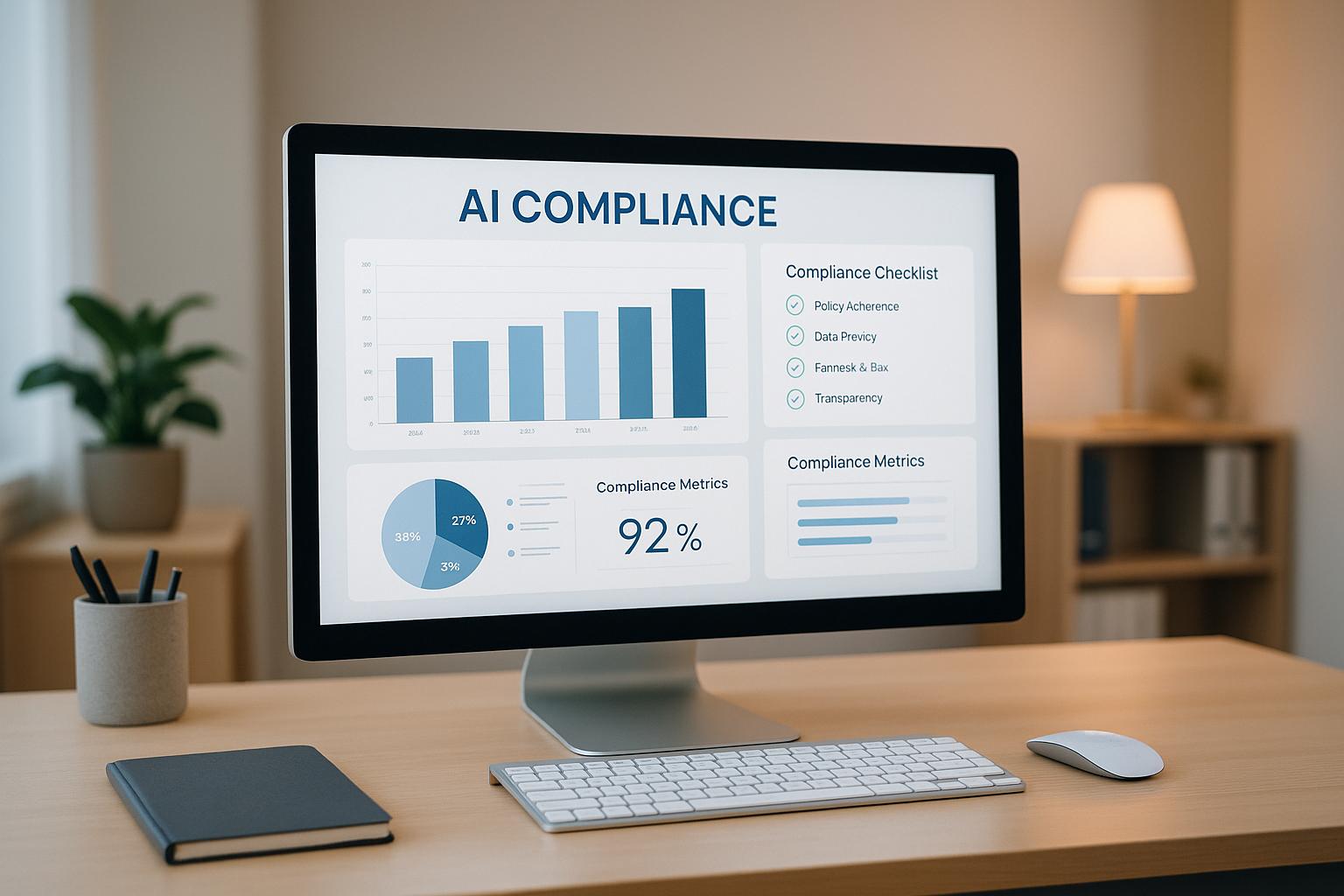
AI compliance is no longer optional for enterprises navigating today’s complex regulatory landscape. From managing SOC 2 and HIPAA in the U.S. to GDPR globally, businesses face mounting pressure to align AI systems with evolving standards. Non-compliance can cost up to 4% of global revenue, while poor governance leads to inefficiencies and security risks.
This guide highlights six top platforms to simplify compliance, automate workflows, and improve oversight:
Each platform caters to specific needs, from small teams to global enterprises, ensuring compliance without disrupting operations. Below, we explore their features, pricing, and industry fit to help you choose the right solution.


Prompts.ai simplifies enterprise AI management by bringing together over 35 AI models, including GPT-5, Claude, LLaMA, and Gemini, into one unified platform. By consolidating tools under a single governance framework, it helps organizations eliminate tool sprawl while adhering to strict compliance requirements. Let’s explore how Prompts.ai meets key regulatory standards.
Prompts.ai provides continuous control monitoring and holds up-to-date certifications, including SOC 2 Type II, HIPAA, and GDPR. Through its dedicated Trust Center, businesses can track the platform’s real-time security posture, including updates on policies, controls, and compliance status.
The platform’s compliance framework addresses critical U.S. and international regulatory needs. It meets SOC 2 Type II standards for secure enterprise data handling, ensures HIPAA compliance for healthcare organizations managing sensitive patient data, and supports GDPR requirements for global companies operating across U.S. and European markets.
Prompts.ai automates compliance-related tasks by turning them into repeatable workflows, ensuring enterprise standards are consistently met. By automating these processes, businesses can reduce manual effort and maintain uninterrupted operations around the clock.
One standout feature is its real-time audit trail system. Every interaction - whether it’s a prompt, model usage, or workflow execution - is logged to create a complete record for regulatory reviews. This comprehensive documentation helps enterprises track and monitor their AI activities from deployment through ongoing operations.
Prompts.ai integrates smoothly with widely-used tools like Slack, Gmail, and Trello, embedding compliance workflows directly into existing systems without disrupting daily operations. This capability extends governance controls across an organization’s entire tech stack.
The platform’s scalable architecture supports unlimited workspaces and collaborators in its business plans, making it ideal for large enterprises with complex setups. Teams can expand AI usage across departments while maintaining centralized oversight through unified dashboards and shared resource management.
Prompts.ai uses a straightforward TOKN credit system, with pricing plans designed to fit various business needs.
All plans include essential features like governance tools, usage analytics, and compliance monitoring. Annual subscriptions come with a 10% discount for upfront payment, helping enterprises manage costs effectively while ensuring predictable AI budgets. The pay-as-you-go model ensures businesses only pay for the AI resources they actually use, avoiding unnecessary expenses tied to unused licenses.

Compliance.ai is a RegTech platform designed to simplify regulatory compliance through the use of cloud and AI technologies. By consolidating compliance efforts across various regulations into a centralized system, it enables a more efficient and integrated approach to managing regulatory requirements.
By unifying internal controls within a single platform, Compliance.ai removes the inefficiencies of fragmented compliance monitoring. The platform automatically scans and analyzes regulatory updates, keeping organizations aligned with evolving requirements. This capability is especially critical for businesses navigating multiple regulatory frameworks, where manual tracking is not only time-consuming but also prone to errors.
The platform’s automation features actively monitor regulatory changes and deliver real-time updates directly to users. This proactive approach increases efficiency and minimizes the risk of missing critical updates.
Richard Dupree, SVP and Operational Risk Manager at Bank of the West, emphasized this benefit:
"Most solutions in the market today are not scalable and still rely on a pull of regulatory content across a multitude of sources, rather than a 'push' of information from a single, reliable source. This is the key value Compliance.ai delivers for banks."
Additionally, the system’s analytical tools assist compliance teams in identifying potential gaps early, helping organizations maintain a proactive stance on compliance.
Compliance.ai is built to integrate seamlessly into existing enterprise workflows through its APIs. It can scale to handle extensive compliance data while maintaining compatibility with current systems. For larger organizations with more intricate compliance demands, the Compliance.ai Enterprise Edition offers advanced features tailored to manage diverse business units, multiple locations, and complex regulatory landscapes.
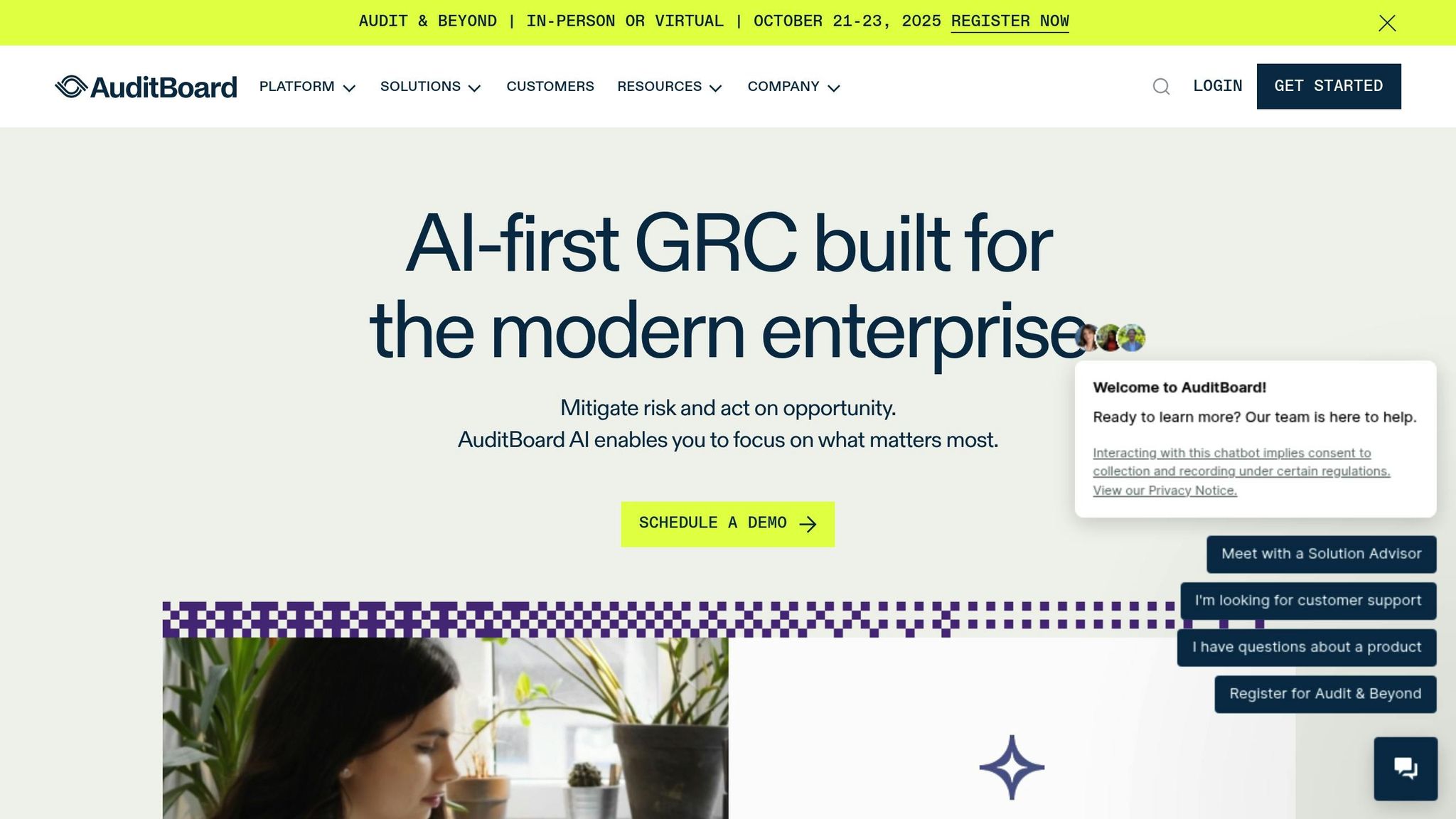
AuditBoard has established itself as a leading compliance management platform, trusted by more than half of Fortune 500 companies. It addresses the increasing complexity of compliance requirements, a challenge underscored by the fact that 23% of SOC 2 reports now feature over 150 security controls - up from 16% in 2023. With its strong foundation, AuditBoard delivers extensive regulatory coverage and advanced automation capabilities.
AuditBoard supports a wide range of U.S. and international regulatory frameworks. These include SOC 2, ISO 27001, PCI DSS, HIPAA, and NIST CSF. The platform streamlines compliance by automatically importing, mapping, and updating controls and requirements. This functionality is particularly beneficial for organizations operating across multiple jurisdictions, where overlapping regulations often complicate compliance efforts.
By automating key compliance tasks, AuditBoard significantly reduces manual workloads. Features like automated evidence collection, control mapping, and continuous monitoring ensure organizations are audit-ready throughout the year.
Christopher Giesler, Manager of IT Internal Audit at Toro Company, praised AuditBoard as an "efficiency booster", allowing his team to achieve more within the same time constraints. This efficiency is crucial, especially as the global average cost of a data breach in 2024 reached a record $2.8 million in lost business - a 10% increase from the previous year.
U.S. Xpress, a transportation company, utilized AuditBoard's automation tools to create Power BI dashboards for audit committee reporting. Rob Zunt, VP of Internal Audit, and Bambi Gifford, Manager of Internal Audit, highlighted how these tools enabled their team to refresh data seamlessly, integrate it into reports, and quickly address questions during meetings. These automation capabilities also complement AuditBoard's integration and scalability features.
AuditBoard integrates effortlessly with cloud providers, identity systems, and security tools, ensuring a continuous flow of evidence. It provides a unified view of compliance efforts and scales alongside organizational growth.
Uriah McCann, Director of Cybersecurity at MDA, shared that AuditBoard gave his team visibility into risks across the business that they had previously lacked. Bill Cancel, Vice President of Information Security at Berkadia, stressed that organizations without solutions like AuditBoard often face double the costs when breaches occur, due to the absence of a mature risk management program.
With its robust features, AuditBoard helps enterprises stay ahead of evolving regulatory challenges while maintaining a strong compliance posture.
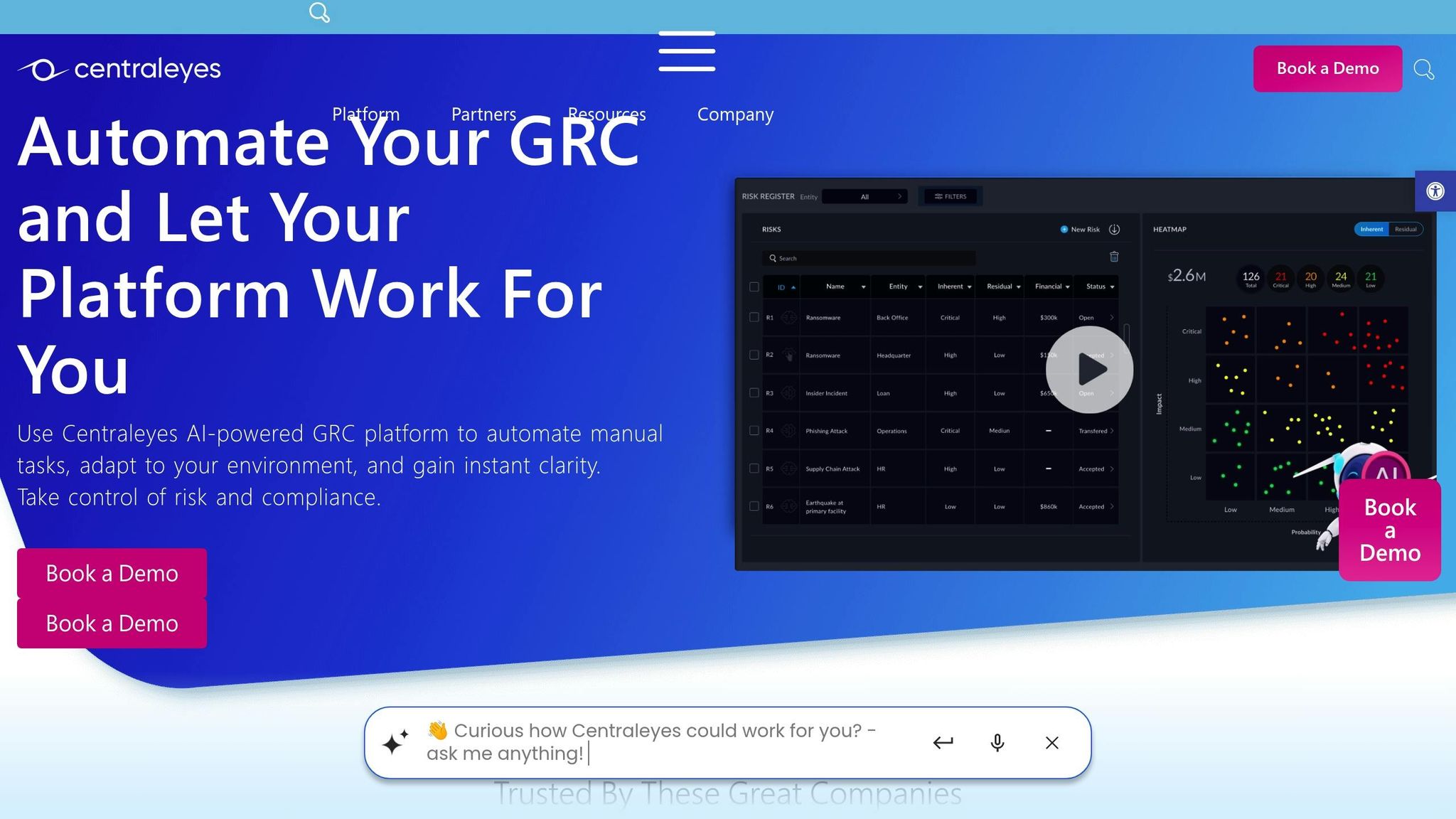
Centraleyes is a comprehensive risk management platform that uses AI to evaluate and monitor compliance risks for enterprise organizations. With a 4.5/5 rating on G2, users consistently highlight its effectiveness in managing governance, risk, and compliance (GRC) needs. Its robust features make it a strong choice for industries like finance, healthcare, and retail, where cybersecurity and regulatory challenges are particularly demanding.
Centraleyes supports a wide array of compliance frameworks, offering the ability to map requirements across more than 180 standards. For global compliance, it includes the full ISO series, ensuring organizations meet international certification demands. In the U.S., it addresses specific regulatory needs such as IRS publication compliance and CJIS (Criminal Justice Information Services) standards, which are critical for sectors like government contracting and financial services. This capability simplifies managing compliance across multiple jurisdictions, making it a valuable tool for global enterprises.
Harnessing its AI-powered risk assessment tools, Centraleyes automates the evaluation and monitoring of risks through a centralized risk register. Compliance data is seamlessly collected and integrated into the system, minimizing manual input. Features like automated workflows and real-time reporting ensure compliance teams can maintain constant oversight, quickly identify gaps, and address exposures with less effort.
Centraleyes enhances its utility by integrating smoothly with enterprise systems, including ITSM tools like JIRA and ServiceNow, enabling real-time, bidirectional data sharing. Its no-code deployment allows organizations to implement and onboard the platform in less than a day. The platform is designed to scale with enterprise growth, offering configurable tools to manage both first-party and third-party risks. Advanced dashboards and automated reporting capabilities make it adaptable to evolving organizational needs and regulatory landscapes, supporting businesses as they expand.
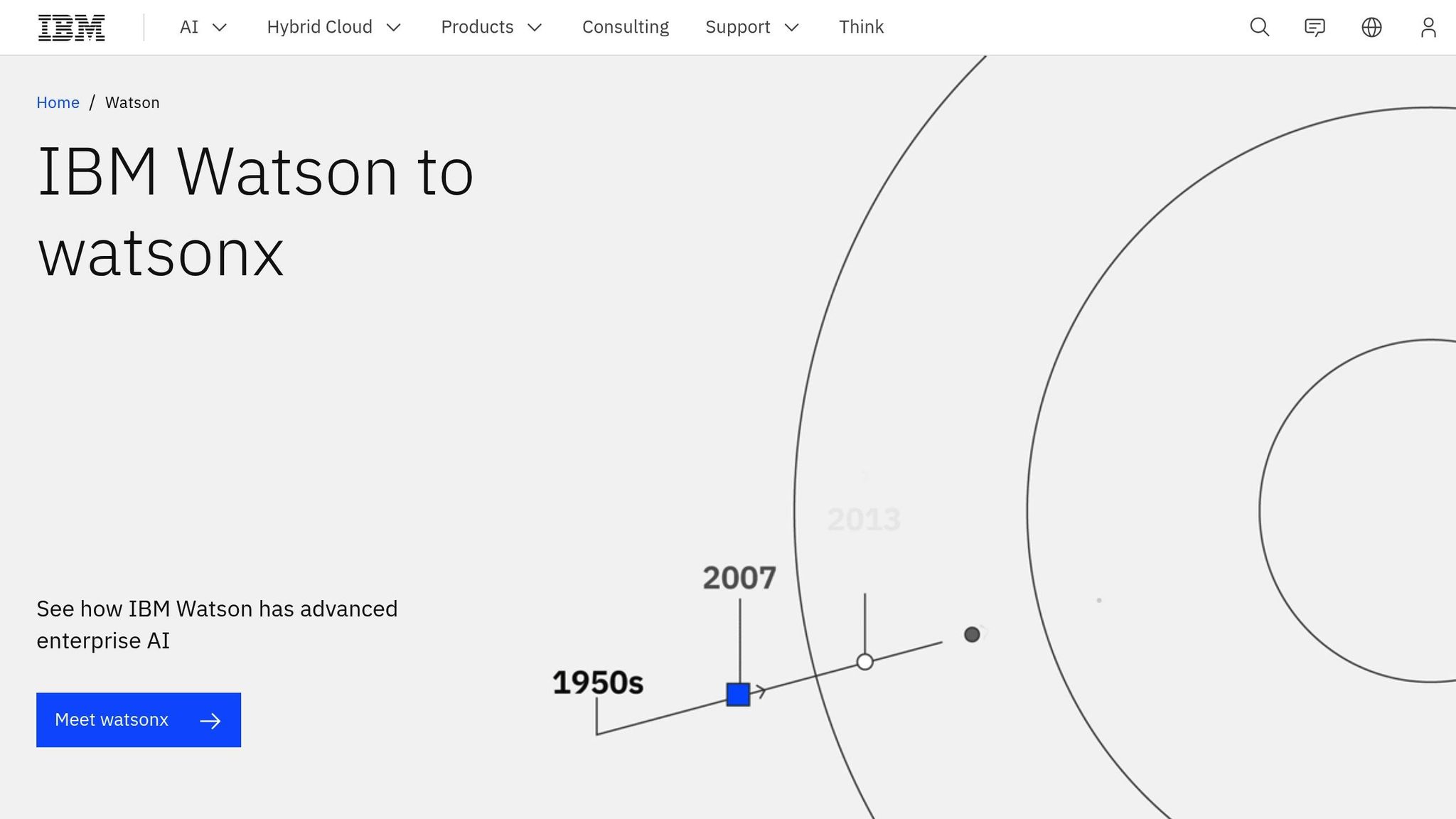
IBM Watson stands out as a platform designed to streamline compliance workflows while prioritizing strong AI governance. By combining IBM's deep enterprise expertise with advanced AI technologies, it helps organizations tackle the challenges of complex regulatory landscapes. Its commitment to responsible AI practices makes it particularly suitable for industries with strict compliance demands, such as healthcare, financial services, and government sectors.
IBM Watson aligns with key compliance standards across various industries. Features like built-in bias detection and model explainability ensure that organizations can adapt to evolving regulations while maintaining ethical AI practices.
The platform simplifies compliance management through automation. It monitors AI systems in real time, tracking performance and adherence to regulations. By logging critical decision points, data lineage, and checkpoints, IBM Watson creates detailed audit trails, helping teams identify and address potential issues early in the process.
IBM Watson integrates effortlessly with existing enterprise systems using pre-built connectors. Its hybrid cloud capabilities allow sensitive data to remain on-premises, ensuring security and compliance. The platform's API-first architecture supports scalability, making it suitable for both small departmental projects and large-scale enterprise deployments.
With a consumption-based pricing structure, IBM Watson provides real-time usage dashboards, enabling businesses to keep a close eye on spending and manage costs effectively.
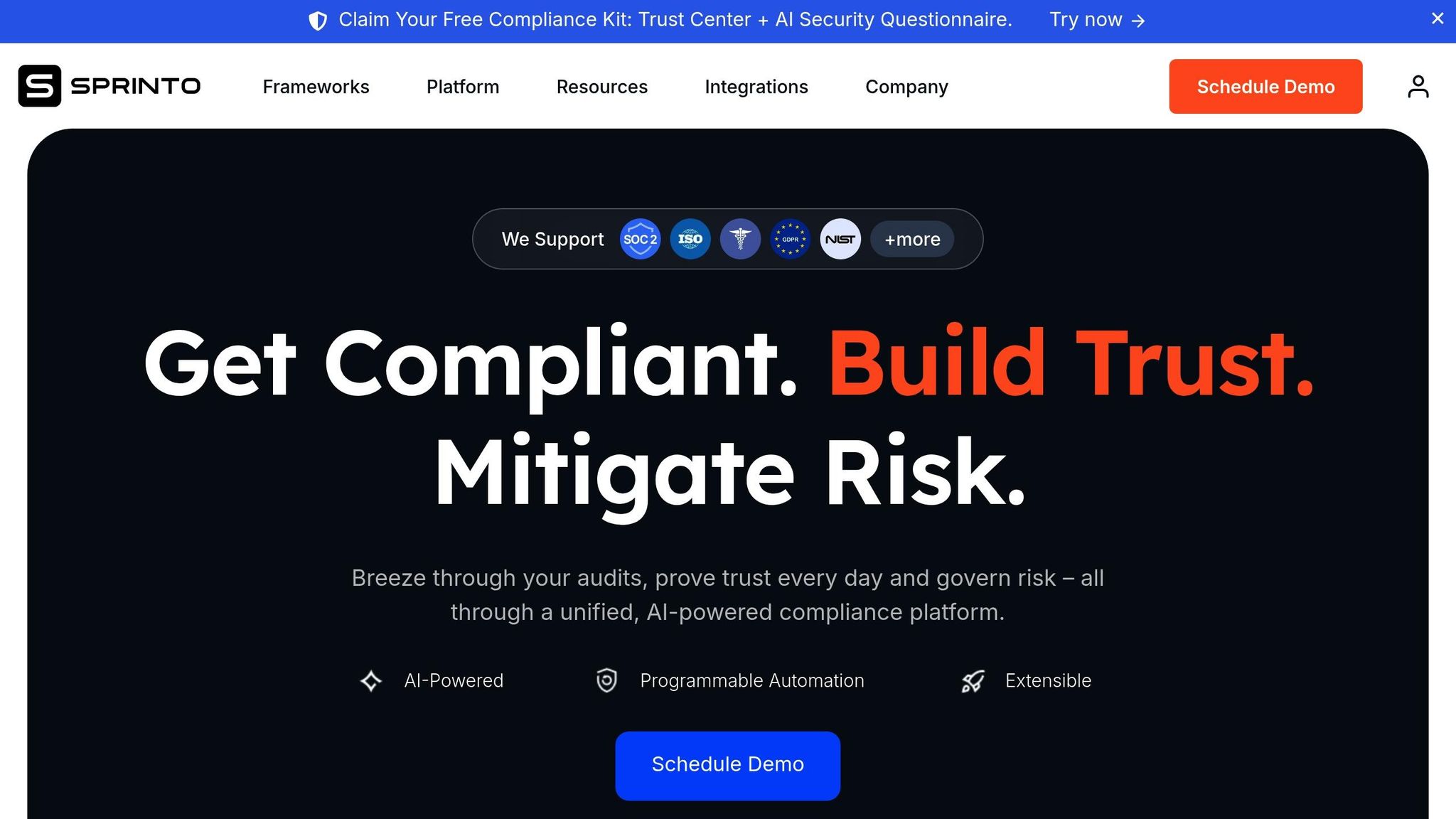
Sprinto uses AI-driven automation to streamline compliance processes, eliminating the need for manual tasks. By continuously organizing, monitoring, and capturing evidence, it transforms how businesses handle regulatory requirements. Unlike traditional tools that only compile task lists, Sprinto's intelligent system prioritizes tasks based on audit needs and nudges teams toward corrective actions when necessary.
One of Sprinto’s standout features is its seamless integration with over 200 cloud services. This allows it to automatically scan systems and infrastructure, identifying compliance gaps in real time. For example, when it detects security patches, software updates, or unusual user access patterns, it promptly alerts relevant teams via email or Slack. This proactive approach has proven effective, with 90% of first-time users achieving audit readiness in under 30 days.
Sprinto’s capabilities extend to supporting over 200 compliance frameworks, including SOC 2, ISO 27017, HIPAA, GDPR, ISO 42001, HITRUST, and NIST. Its AI automatically maps identified risks to the appropriate compliance controls, saving organizations from manual efforts. For U.S.-based enterprises, Sprinto also addresses state-specific regulations like the California Privacy Rights Act (CPRA) alongside federal standards. By continuously monitoring compliance health across all frameworks, it ensures organizations stay up-to-date with regulatory changes, automatically updating compliance templates as needed.
Sprinto’s automation delivers results up to eight times faster than manual methods. It handles evidence collection, control testing, and audit trail generation without requiring human input. The platform runs automated control tests, identifies anomalies, and facilitates timely remediation, ensuring compliance gaps are promptly addressed. It also generates precise, timestamped audit evidence, making the audit process more efficient.
Additionally, Sprinto produces detailed compliance reports tailored for auditors. These include health assessments, gap analyses, vendor insights, and risk evaluations, offering a clear view of an organization’s security posture and regulatory alignment.
Sprinto is designed for easy integration across both departmental and enterprise-wide systems. Its API-first approach and low maintenance requirements make it scalable and efficient. Enterprise users report integration with minimal effort and require less than an hour of weekly maintenance.
Sprinto offers a clear and predictable pricing structure. Its Starter Platform, designed for up to 100 employees, includes core features such as automated evidence collection for $7,500 annually. Adding a compliance framework like SOC 2, ISO 27001, HIPAA, CPRA, or GDPR starts at $2,000 per year. For larger enterprises, the annual license fee is adjusted based on factors like company size, geographic reach, and infrastructure complexity. This pricing model ensures organizations can plan their budgets effectively while benefiting from significant efficiency gains, often reducing compliance scaling efforts by 90%.
When selecting AI compliance software, it’s important to weigh features, pricing, and regulatory focus. Below is a comparison of leading platforms, detailing their strengths and target industries.
| Platform | Key Strengths | Annual Pricing (USD) | Target Enterprise Size | U.S. Compliance Focus | Industry Fit |
|---|---|---|---|---|---|
| Prompts.ai | Unified AI orchestration, 35+ LLMs, real-time cost controls, enterprise governance | Core: $1,188/user Pro: $1,428/user Elite: $1,548/user |
Mid to large enterprises | AI model governance, data privacy controls, audit trails | Technology, finance, healthcare, creative agencies |
| Compliance.ai | Regulatory monitoring, automated policy updates, intelligent risk assessment | Custom pricing (typically $50K–$200K+) | Large enterprises (1,000+ employees) | SEC, FINRA, CFTC, state banking regulations | Financial services, banking, investment management |
| AuditBoard | Risk management, collaborative workflows, executive dashboards | $15K–$100K+ based on modules and users | Mid to large enterprises (500+ employees) | SOX, COSO, NIST, state privacy laws | Public companies, financial services, healthcare |
| Centraleyes | Cyber risk quantification, vendor risk management, continuous monitoring | $25K–$150K annually depending on scope | Mid to large enterprises (200+ employees) | NIST Cybersecurity Framework, state data breach laws | Technology, manufacturing, professional services |
| IBM Watson | Governance, lifecycle management, bias detection | $50K–$500K+ for enterprise deployments | Large enterprises (2,000+ employees) | Federal AI guidelines, NIST AI Risk Management Framework | Government contractors, healthcare, financial services |
| Sprinto | Automated evidence collection, 200+ compliance frameworks, rapid deployment | Starter: $7,500 base + $2,000 per framework | Small to mid enterprises (up to 500 employees) | SOC 2, HIPAA, CPRA, GDPR, NIST | SaaS companies, healthcare, e-commerce |
This table highlights how each platform caters to different needs, offering a variety of pricing models, compliance focuses, and enterprise sizes. For instance, Prompts.ai provides transparent per-user pricing, making it ideal for scaling teams, while IBM Watson and Compliance.ai are tailored for larger enterprises with complex governance requirements.
Geographic coverage is critical for U.S. enterprises navigating multi-state regulations. Solutions like Sprinto and AuditBoard address mandates such as CPRA and state data breach laws, ensuring compliance across diverse jurisdictions.
Deployment timelines also vary. Some platforms, like Sprinto, emphasize rapid implementation, while others may require more time for setup and integration. This is an important consideration when balancing urgency with functionality.
Industry focus further distinguishes these platforms. Financial services often lean toward Compliance.ai for its regulatory monitoring, whereas technology firms may prefer Prompts.ai for its AI orchestration capabilities. Healthcare organizations, on the other hand, prioritize platforms like AuditBoard and Sprinto for their strong HIPAA compliance features.
Finally, total cost of ownership goes beyond subscription fees. Licensing, implementation, training, and ongoing maintenance should all factor into the decision. Some platforms simplify maintenance, while others may require more extensive support. Evaluating these operational costs alongside functionality ensures a well-informed choice.
Choosing the right AI compliance software is a pivotal decision for U.S. businesses navigating the ever-evolving landscape of regulations. Achieving effective compliance hinges on a platform that balances extensive regulatory coverage with practical, real-world application. Among the options reviewed, Prompts.ai emerges as a standout solution, offering unified AI orchestration and advanced governance capabilities.
One of the key advantages of Prompts.ai is its ability to automate labor-intensive processes. Real-time risk assessments and automatic policy updates significantly reduce the need for manual oversight, making it an invaluable tool for managing the intricacies of regulatory compliance. This streamlined approach not only saves time but also ensures organizations remain vigilant in the face of complex requirements.
Scalability is another critical factor, and Prompts.ai is built to grow alongside your business. Whether you're expanding your user base or navigating new regulatory territories, its unified orchestration ensures compliance efforts remain efficient and effective.
Cost transparency further sets Prompts.ai apart. With clear, per-user pricing, businesses can plan budgets confidently without hidden fees or surprises - an essential feature in today’s market.
Successful adoption of AI compliance software requires aligning the platform’s capabilities with the specific needs of your industry and workflows. Whether you operate in financial services, technology, or healthcare, prioritizing robust regulatory monitoring, AI model governance, and data privacy controls is essential to overcoming compliance challenges.
The ideal compliance software simplifies, rather than complicates, your operations. By combining broad regulatory coverage, intuitive workflows, transparent pricing, and scalable functionality, Prompts.ai equips organizations to maintain regulatory confidence while fostering sustainable growth. This cohesive approach to AI governance underscores the importance of reducing complexity and enhancing oversight across enterprises.
Prompts.ai provides a powerful way for enterprises to handle AI compliance with ease. With its cutting-edge tools, businesses can confidently meet regulatory requirements while encouraging the responsible use of AI across their operations.
Some standout advantages include smoother compliance procedures, real-time tracking of AI workflows, and insights specifically designed for enterprise needs. By simplifying compliance integration, Prompts.ai helps organizations save time, minimize risks, and uphold trust in their AI-powered projects.
Prompts.ai is built to prioritize compliance, aligning with key regulatory frameworks like SOC 2, HIPAA, and GDPR. The platform integrates strong security measures, rigorous data privacy protocols, and responsible AI principles to meet these standards.
With ongoing monitoring, frequent audits, and adherence to industry best practices, Prompts.ai enables businesses to stay compliant while promoting trust and openness in their AI workflows. By focusing on safeguarding data and encouraging responsible AI usage, we help organizations confidently navigate the challenges of regulatory requirements.
Prompts.ai caters specifically to the demands of large enterprises, offering effortless scalability alongside powerful governance tools. By integrating more than 35 advanced language models, it allows for side-by-side comparisons and fine-tuned control over prompt workflows, output quality, and overall performance. This setup ensures businesses can stay compliant while streamlining their AI operations.
The platform also includes a built-in FinOps layer, delivering real-time insights into usage, spending, and return on investment (ROI). This helps enterprises manage costs effectively while adhering to regulatory standards. With these capabilities, Prompts.ai makes managing AI governance straightforward, even for organizations with intricate requirements.


